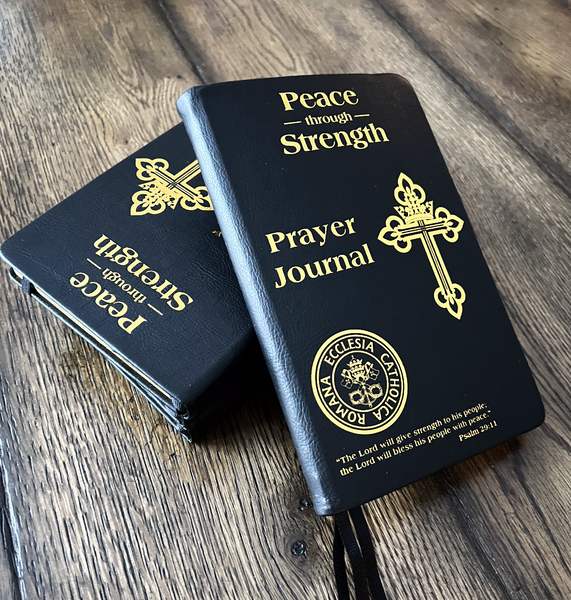Day 25 – 90 Days to Liberty
by Fr Richard Heilman | March 23, 2023 12:05 AM
Prayer is our outstanding supernatural resource for fighting the wiles of the enemy!
“Prayer is, beyond doubt, the most powerful weapon the Lord gives us to conquer evil … but we must really put ourselves into the prayer, it is not enough just to say the words, it must come from the heart. And also prayer needs to be continuous, we must pray no matter what kind of situation we find ourselves in: the warfare we are engaged in is ongoing, so our prayer must be on-going also.” – St. Alphonsus
You see? Whether it’s a Navy SEAL or a Saint, we admire those who put it all on the line — go “all in!” — those who are totally dedicated to the mission … and God admires them too. Throughout salvation history, we have seen how God responds to this resolute and determined kind of prayer, just as Jesus taught His disciples. It was in Nineveh that the entire city turned back to God and did all that they could, through prayer and fasting, to “demonstrate to” God that they were absolutely resolute in this “turning.” God saw how “serious” they were about this, and He was moved (Jonah 3:3-10[1]). This is yet another story that demonstrates how God – a perfect Father – compels His children to be truly resolute and quite serious when calling out to Him.
The heroes of our faith are the warrior saints who have gone before us. God worked mightily and miraculously through them. Therefore, we must study their ways. How did they remain so well connected, in such strong friendship with God, so that His river of supernatural grace could flow so freely through them? What do these “SEALS for Christ” teach us about the ideal spiritual disciplines, the ultimate daily regimen of prayer?
The following are those top ten ideal and most rock-solid foundational practices of an authentically strong Catholic.
- The Morning Offering
- The Angelus (6 AM, noon, 6 PM)
- Mental Prayer (at least 15 minutes)
- Spiritual Reading (at least 15 minutes)
- Frequent Confession (at least once a month)
- Holy Mass and Communion
- Adoration of the Blessed Sacrament (regularly)
- Acts of Mortification (especially fasting)
- The Holy Rosary
- Brief Examination of Conscience (at night)
Our Daily Prayer for Liberty and for a Holy Spirit Revival
“Free us from every force of oppression, both internally and externally. Grant to our leaders the wisdom to protect and promote our liberties; by your grace may we have the courage to defend them, for ourselves and for all those who live in this blessed land. Heavenly Father, grant a Holy Spirit Revival in our land!” (Based on a prayer by the USCCB)
“Freedom from Wrath” by Fr. Bill Peckman
In the medieval classic, The Divine Comedy: Inferno, Dante places the wrathful in the 5th circle of Hell. The wrathful spend eternity forever fighting each other on the surface of the River Styx while the sullen and resentful gurgle beneath the surface of the river. These are fitting punishments for the wrathful. For the warlike wrathful (those who actively engage in harm to those who harmed them) it is fitting that they spend eternity forever inflicting the eternal cycle that revenge begets. It is appropriate as well that the embittered and resentful drown in a river of their passive-aggressiveness and resentment. In either case, wrath is unable to produce any positive in a person’s life.
As a connoisseur of social media, on more than one occasion I have seen memes saying that moments of righteous indignation are okay because Jesus toppled tables of moneychangers and livestock sellers in the temple as if what we are witnessing is a divine temper tantrum. Is Jesus really indulging in a deadly sin? No. More on that in a bit.
Wrath has become quite dominant in our culture right now. Real and perceived injustices are both met with a carte blanche to seek retribution through violent means. Real perpetrators, or even innocent bystanders, are punished in a wave of violence that can only beget a backlash that perpetuates more violence. For the wrathful, any slight, real or perceived, is just grounds for vicious retribution and despoiling of reputation through gossip, detraction, and calumny. The devil himself is full of wrath. His anger with God at creating humanity, and seeing that as a slight against him and the other fallen angels, has become cause for him to wage an eternal battle with not just God but with His creation. All temptation in generated by the devil’s eternal resentment and rebellion against God. The devil in his pride loves nothing more than for us to engage in his same behavior of wrath. Misery loves company.
Jesus places a premium on mercy and forgiveness in the Gospels…even from the Cross. He tells us, “But I say to you, love your enemies: do good to them that hate you: and pray for them that persecute and calumniate you: Then you will prove yourselves sons of Your heavenly Father” (Matthew 5:44-45). Similar lines are repeated in the Gospels multiple times. What then of flipping tables? We are told Jesus is full of zeal and not wrath. These things did not belong in the temple area. His expulsion of these things was not a divine hissy fit, but a sign that He came to restore what was needed and cast out what was not. He is not avenging Himself on these sellers; He is exorcising from the Temple what is foreign to it.
The antidote for wrath is, as we see above, mercy and forgiveness. There are two things to understand in this. First, to forgive means to no longer hold against (as in a loan) a person their debt/trespass/sin for future reference. It does not mean to condone or rationalize evil done to you. Mercy is to render to another person what is needed, whether they deserve it or not. In many homilies, I have referred to mercy and forgiveness as the ultimate acts of self-preservation. Wrath can ruin us on every level of our being. Mercy frees us from such a cross of iron.
It is incredibly important that we forgive. Our eternal life in heaven hinges on our ability to do so. In the Our Father we pray, “forgive us our trespasses as we forgive those who trespass against us!” In other words: “God, forgive me as I forgive others.” That little prayer tucked into the Our Father can either be a blessing or an eternal curse depending upon our ability to forgive and our ability to stem wrath in our lives. After giving us the Our Father, Jesus warns us, “For if you will forgive men their offenses, your heavenly Father will forgive you also your offenses. But if you will not forgive men, neither will your Father forgive you your offenses” (Matthew 6:14-15). We entertain wrath and revenge at our own peril. We run the risk of the wicked servant in Matthew 18:23-35 who, because he was unwilling to forgive the much lesser debt of a fellow servant after he himself had a huge debt forgiven by the master, was now thrown into prison. It ends with the rather ominous “So my Father will do to you if you do not forgive your brother from your heart.” Wrath can have no hold in the life of a follower of Christ. (From “Let Freedom Ring[2]“)
You can enlist in the United States Grace Force HERE[3] (please recruit family and friends!)
Information on the United States Grace Force can be found HERE[4]
We highly recommend ordering the book “Let Freedom Ring[2]” authored by Fr. Bill Peckman, Fr. James Altman and Fr. Rick Heilman. This amazing book will be a great tool for easy access, highlighting and bookmarking as you traverse through the first 40-days of our 90 Days to Liberty journey with tens of thousands of other special forces prayer warriors!
You can order the book at RomanCatholicGear.com[5].
You may want to consider using the Hallow App for Lent: Hallow.com[6]
GET YOUR PEACE THROUGH STRENGTH PRAYER JOURNAL …
HERE[7]
 [8]
[8]

- Jonah 3:3-10: https://www.biblegateway.com/passage/?search=Jonah%203:3-10
- Let Freedom Ring: https://romancatholicgear.com/collections/books/products/let-freedom-ring-book
- HERE: https://visitor.r20.constantcontact.com/manage/optin?v=001ESuSGaJpYPCG2iUdd4j4bkKwd4gkh2ZUVbam_Ty9rCn6blH6_U3cI2D8UvSLEcSzHnC4eq2UWmK1I0SbEw0SPKqnkZ2j0Z4J4D-_m4dD6CKJU9day-bBa8Qnx4dv7RLDIVlYAjL1JWsjfUTNPH2jQIVY9gbdbz4O4oMIzv5V1dT_upQsD8cX86iq_5Y-x4eLrTVtdOmA24s%3D
- HERE: https://usgraceforce.com/god-wants-you-enlist-in-the-grace-force/
- RomanCatholicGear.com: https://romancatholicgear.com/collections/grace-force
- Hallow.com: https://hallow.com
- HERE: https://romancatholicgear.com/collections/peace-through-strength-1
- [Image]: https://romancatholicgear.com/collections/peace-through-strength-1
Source URL: https://usgraceforce.com/day-25-90-days-to-liberty/